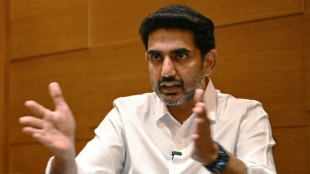

China posts lacklustre Q3 economic data as key Beijing conclave starts
China's economy grew at its slowest pace in a year last quarter, official data showed Monday, as high-ranking leaders kicked off a closely watched meeting in Beijing focused on long-term policy planning.
The data was released just hours before state media announced the start of the four-day conclave, where top brass from the ruling Communist Party are expected to discuss strategies to address sluggish household spending and persisting woes in the vast property sector.
It also comes ahead of in-person discussions later this month between top Chinese and US trade officials -- as well as a potential meeting between presidents Donald Trump and Xi Jinping.
Trump earlier this month threatened blistering 100 percent tariffs on Chinese goods from November 1, in response to Beijing's sweeping export controls in the strategic rare earths sector.
Gross domestic product in the July-September quarter expanded 4.8 percent year-on-year, the National Bureau of Statistics (NBS) said, down from 5.2 percent in the previous three months.
The figure was on par with an AFP forecast based on a survey of analysts.
It also represented the slowest growth since the same quarter last year, when GDP expanded 4.6 percent.
As trade pressure builds, experts say China must adjust to a growth model driven more by domestic household spending than exports and manufacturing.
Such a transition is likely to be on the table at this week's "fourth plenum" political gathering in Beijing.
Chinese state media and officials have been taciturn about specific policy proposals included in the country's 15th five-year plan -- the main subject of this week's meeting.
But Xinhua said early Monday that the new plan, which covers the period from next year to 2030, will involve efforts to "strengthen the foundation of people's livelihoods", including by "investing in people".
The report ahead of the plenum also made several references to "new quality productive forces" -- a term Beijing uses to describe key technologies it hopes to achieve self-sufficiency in to ensure long-term growth.
- Consumer slump -
Domestic spending has lagged in recent years, having failed to fully recover from the Covid-19 pandemic.
Alin, a 40-year-old administrative assistant at an insurance company, told AFP in Beijing on Monday that she felt "current consumer subsidies are not quite enough" to get the economy humming again.
"It's more of a global issue," she added, noting concerns including job security, education-related expenses and real estate prices.
New residential property prices fell year-on-year in September in 61 out of 70 cities surveyed, NBS data showed Monday, a sign of persisting homebuyer wariness.
Fixed-asset investment in the first three quarters saw a slight decline of 0.5 percent year-on-year, largely because of a sharp contraction in real estate investment.
That decline is "rare and alarming", Zhiwei Zhang of Pinpoint Asset Management wrote.
Despite noting recent stimulus measures "should help to mitigate the downward pressure on investment" in the fourth quarter, he said "the risk to GDP growth in Q4 is likely on the downside".
In a further sign of weakness, the NBS said retail sales growth slid to three percent year-on-year in September, in line with estimates in a Bloomberg survey, but down from August and the slowest rate since November.
"This slowdown reflects the waning impact of the consumer goods trade-in scheme, which had boosted sales of certain products earlier in the year," wrote Julian Evans-Pritchard of Capital Economics.
"China's growth is becoming increasingly dependent on exports, which are offsetting a slowdown in domestic demand," he wrote.
"This pattern of development is not sustainable," he added.
In one bright spot, industrial production rose 6.5 percent last month, the data showed, outperforming the five percent forecast in a Bloomberg survey.
Beijing and Washington agreed over the weekend to conduct a fresh round of trade talks this week.
Fears of a full-on trade war have been eased after Trump told Fox News that 100 percent levies on all Chinese goods were "not sustainable".
J.Fletcher--NG



